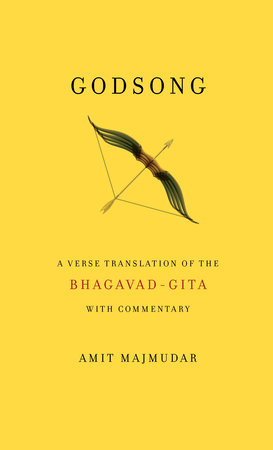Amit Majmudar—novelist, poet, translator, essayist, and diagnostic nuclear radiologist—interviewed by Samuel Loncar, Editor-in-Chief of The Marginalia Review of Books.
Introduction
As a part of welcoming novelist, poet, translator, essayist and diagnostic nuclear radiologist, Amit Majmudar to Marginalia as a Contributing Editor, I had the honor of interviewing him for our pages. Majmudar’s many publications reflect his wide-ranging interests, which include science and medicine, Hindu mythology, history, translation, children’s literature, poetry, and fiction. His most recent books include: Black Avatar and Other Essays (available for per-order, Acre Books, April 2023), What He Did in Solitary (Knopf, 2020), and Godsong: A Verse Translation of the Bhagavad-Gita, with Commentary (Knopf/Penguin Random House India, 2018).
His poetry has appeared in The New Yorker, The Best of the Best American Poetry, 25th Anniversary Edition, numerous Best American Poetry anthologies, and Poetry Magazine, as well as the Norton Introduction to Literature. His first poetry collection, 0′,0′, was shortlisted for the Norma Farber Poetry Award from the Poetry Society of America, and his second collection, Heaven and Earth, won the Donald Justice Award. His poetry has also won the Anne Halley Prize, the Pushcart Prize, and he served as Ohio’s first Poet Laureate. His prose has appeared in The New York Times, The O. Henry Prize Stories 2017, and The Best American Essays 2018, and his novel Partitions (Holt/Metropolitan, 2011) was shortlisted for the HWA/Goldsboro Crown Prize for Historical Fiction and was named Best Debut Fiction of 2011 by Kirkus Reviews.
Interview
Samuel Loncar
You are a novelist, essayist, translator, and poet, and you are also a diagnostic nuclear radiologist. It’s an impressive and unusual combination of identities, though with a long tradition (the literary doctor). Could you speak to the importance of both the humanities and science in your own life as a writer and doctor?

Amit Majmudar
I think that—even though I would prefer to think of myself as perfectly compartmentalized, with the pure-poet part of me creating pure art—the reality is that my scientific and medical training have probably changed the way I think and write. I don’t know if I have enough distance to realize exactly how. I can’t run the experiment over again and see what I would write like if I hadn’t chosen this profession.
I suspect that it has touched my prose more than my poetry because my poetry resembles, with astonishing continuity, the kind of things I was writing, or striving to write, as a seventeen year old. My abilities grew as I got older; that is, I was able to turn those imagined poems into real poems with a higher degree of fidelity, and I learned to let the imagined poem not get in the way of the poem that was writing itself.
With prose, though, I think my scientific training has made me more analytical, more questioning, and more attuned to science’s limitations. I am pretty sure that if I had never studied the sciences, I might have had an inflated notion of what they can do and what questions that kind of thinking can be applied to. I know it too well; I do not romanticize it. In fact, I have never romanticized it, even at seventeen, when I decided to enter an MD-focused accelerated program and thereby avoid studying literature and religion formally in the university setting.
I chose radiology primarily for that reason. So the central importance of my MD is that it funds my literary peregrinations. I get to be my own Maecenas, or in modern terms, my own MacArthur Foundation. That, in turn, frees me up to pursue esoteric things in writing, like translating a Sanskrit poem, or retelling an epic, or writing poems in invented forms, or writing a historical novel about the Partition. I don’t worry about whether book clubs and bestseller lists will be hospitable to what I write (though I probably should).
Samuel Loncar
So, freedom to think and write was deeply connected to your career choice. That makes me think of your Twitter, which is an amazing collection of the many types of books that you’re reading, movies you’re watching, and tweets or threads that offer insightful comments on these works. It creates an incredible resource for people, but it also suggests a trail of books and media that might be inspiring your own writing. For you, how important is being a reader to being a writer?
Amit Majmudar
Picasso once said, “I go for a walk in the forest of Fontainebleau. I get ‘green’ indigestion. I must get rid of this sensation into a picture.”
I feel as though reading a book, or reading around in an era or style or genre, is my equivalent of walking in the forest of Fontainebleau. That is what is going on. I fill myself with a certain “feel” of a culture or a style or a form, and then it transfigures into something new (or at least derivative in a hopefully original or interesting way). The flexibility to absorb and create, or re-create, a wide variety of reading in one’s own writing is something that tends to vanish over time. Pluripotentiality is a quality of stem cells. I write a lot of different things in different styles and tones because I read a lot of different things and remain open to letting them inspire me. So reading is a writerly act for me, inextricable from it, just as filling the gas tank is inextricable from driving the car.
Samuel Loncar
The image of reading as gas in the car is so clear and useful. What your read fills you with the energy to do what you desire to do as writer and translator. Speaking of those roles, you’re created a beautiful translation of the Bhagavad-Gita: Godsong: A Verse Translation of the Bhagavad-Gita, with Commentary (Knopf/Penguin Random House India, 2018).
What makes this sacred text exciting and readable for everyone right now? What does the Bhagavad-Gita offer, in your view, to everyone?

Amit Majmudar
The Gita is a scripture without an outgroup—that is, even though it takes place on a literal battlefield, there is no rant against the opposing side; nor are there rants against unbelievers or heathen or infidels or whatnot. So anyone can approach the Gita without feeling their particular religious background or faith affiliation is under attack.
Its message of the underlying unity of all living things—the unity of the self and Brahman—and its exhortation to take part in the struggle of life, however painful, is pertinent to everyone, whether you apply it to environmentalism or social justice or to personal struggles in your everyday life.
And oh yeah—it’s one of the finest poems ever written, complete with a vision of the universal form of the divine. I can only hope my translation has brought some of that into English!
Samuel Loncar
That is beautiful and compelling vision, and a good reminder that one image of life is the battlefield, the place where we fight for what is worth loving and believing in, whether it is the earth, human rights, or our own personal struggles.
So what can we look forward to next? What is your latest work or project?
Amit Majmudar
Among the things I’m working on right now, pertinent to Marginalia perhaps, is a nonfiction book called Ohioan, Hindu, Hellene. This concerns a curious question that is one of the conundrums of the world’s religious history, which is why the Hindu religion has survived.
Comparable polytheistic religious traditions, indigenous to various other parts of the world, have “flipped” to either Christianity or Islam, depending on which religion ruled the area. Much of India was ruled for centuries by imperialists from either monotheistic tradition, and the pattern was fulfilled, and in parts of the subcontinent, things happened as expected—but it was incomplete, it was somehow resisted and subverted in a way neither Hellenic religion, nor Amerindian religions, nor African traditional religions have done.
So there is this holdout religion still present of immense antiquity in our time, still inspiring living people (myself included), in spite of manifest similarities to superceded religions (such as the Hellenic religion). Why did Hinduism survive? I am answering this question with a hybrid of memoir, history, storytelling, metaphysical discussion, and theology. It is similar to Black Avatar (my exploration of color bias in India, forthcoming in April) but on a larger scale and with a more sweepingly theological and historical subject matter. It grapples with some delicate issues…delicately.
Amit Majmudar is a poet, novelist, essayist, translator, and the former first Poet Laureate of Ohio. He works as a diagnostic and nuclear radiologist and lives in Westerville, Ohio, with his wife and three children. Majmudar’s essays have appeared in The Best American Essays 2018, the New York Times, and the Times of India, among several other publications. His forthcoming collection of essays, focusing on Indian religious philosophy, history, and mythology, is Black Avatar and Other Essays (Acre Books, 2023). Twin A: A Life (Slant Books, 2023) is the title of a forthcoming memoir, in prose and verse, about his son’s struggle with congenital heart disease. Learn more at www.amitmajmudar.com. Tweets @AmitMajmudar
Samuel Loncar is a philosopher and writer, the Editor of the Marginalia Review of Books, the creator of the Becoming Human Project, and the Director of the Meanings of Science Project at Marginalia. His work focuses on integrating separated spaces, including philosophy, science and religion, and the academic-public divide. Learn more about Samuel’s writing, speaking, and teaching at www.samuelloncar.com. Tweets @samuelloncar
